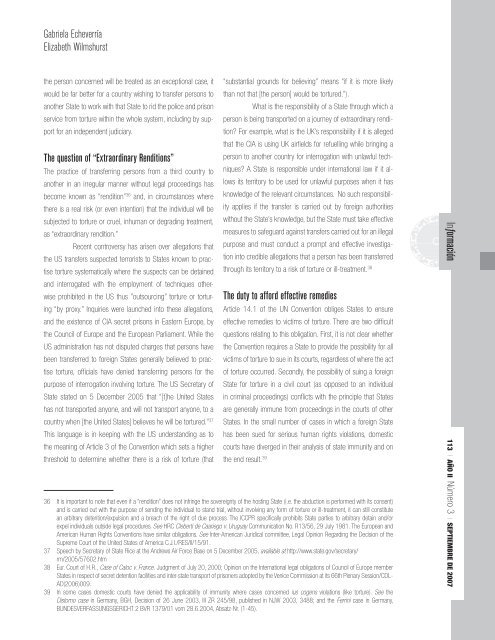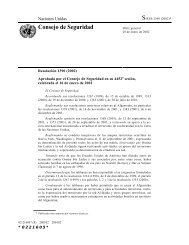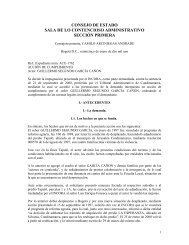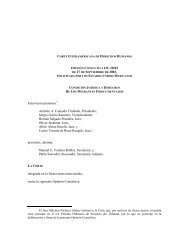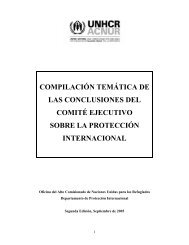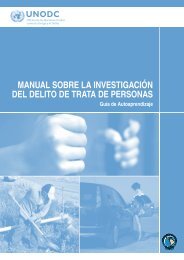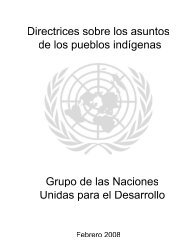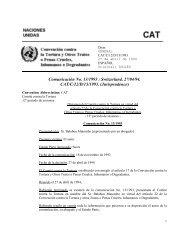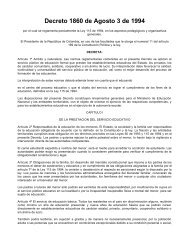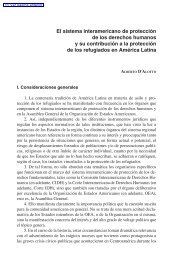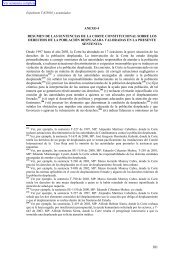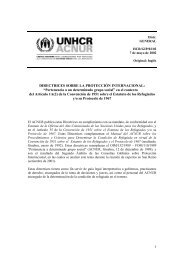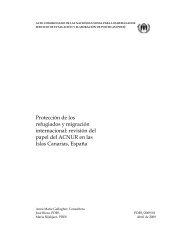Debates sobre los derechos humanos y el sistema ... - Acnur
Debates sobre los derechos humanos y el sistema ... - Acnur
Debates sobre los derechos humanos y el sistema ... - Acnur
You also want an ePaper? Increase the reach of your titles
YUMPU automatically turns print PDFs into web optimized ePapers that Google loves.
Gabri<strong>el</strong>a Echeverría<br />
Elizabeth Wilmshurst<br />
the person concerned will be treated as an exceptional case, it<br />
would be far better for a country wishing to transfer persons to<br />
another State to work with that State to rid the police and prison<br />
service from torture within the whole system, including by support<br />
for an independent judiciary.<br />
The question of “Extraordinary Renditions”<br />
The practice of transferring persons from a third country to<br />
another in an irregular manner without legal proceedings has<br />
become known as “rendition” 36 and, in circumstances where<br />
there is a real risk (or even intention) that the individual will be<br />
subjected to torture or cru<strong>el</strong>, inhuman or degrading treatment,<br />
as “extraordinary rendition.”<br />
Recent controversy has arisen over allegations that<br />
the US transfers suspected terrorists to States known to practise<br />
torture systematically where the suspects can be detained<br />
and interrogated with the employment of techniques otherwise<br />
prohibited in the US thus ”outsourcing” torture or torturing<br />
“by proxy.” Inquiries were launched into these allegations,<br />
and the existence of CIA secret prisons in Eastern Europe, by<br />
the Council of Europe and the European Parliament. While the<br />
US administration has not disputed charges that persons have<br />
been transferred to foreign States generally b<strong>el</strong>ieved to practise<br />
torture, offi cials have denied transferring persons for the<br />
purpose of interrogation involving torture. The US Secretary of<br />
State stated on 5 December 2005 that “[t]he United States<br />
has not transported anyone, and will not transport anyone, to a<br />
country when [the United States] b<strong>el</strong>ieves he will be tortured.” 37<br />
This language is in keeping with the US understanding as to<br />
the meaning of Article 3 of the Convention which sets a higher<br />
threshold to determine whether there is a risk of torture (that<br />
“substantial grounds for b<strong>el</strong>ieving” means “if it is more lik<strong>el</strong>y<br />
than not that [the person] would be tortured.”).<br />
What is the responsibility of a State through which a<br />
person is being transported on a journey of extraordinary rendition?<br />
For example, what is the UK’s responsibility if it is alleged<br />
that the CIA is using UK airfi <strong>el</strong>ds for refu<strong>el</strong>ling while bringing a<br />
person to another country for interrogation with unlawful techniques?<br />
A State is responsible under international law if it allows<br />
its territory to be used for unlawful purposes when it has<br />
knowledge of the r<strong>el</strong>evant circumstances. No such responsibility<br />
applies if the transfer is carried out by foreign authorities<br />
without the State’s knowledge, but the State must take effective<br />
measures to safeguard against transfers carried out for an illegal<br />
purpose and must conduct a prompt and effective investigation<br />
into credible allegations that a person has been transferred<br />
through its territory to a risk of torture or ill-treatment. 38<br />
The duty to afford effective remedies<br />
Article 14.1 of the UN Convention obliges States to ensure<br />
effective remedies to victims of torture. There are two diffi cult<br />
questions r<strong>el</strong>ating to this obligation. First, it is not clear whether<br />
the Convention requires a State to provide the possibility for all<br />
victims of torture to sue in its courts, regardless of where the act<br />
of torture occurred. Secondly, the possibility of suing a foreign<br />
State for torture in a civil court (as opposed to an individual<br />
in criminal proceedings) confl icts with the principle that States<br />
are generally immune from proceedings in the courts of other<br />
States. In the small number of cases in which a foreign State<br />
has been sued for serious human rights violations, domestic<br />
courts have diverged in their analysis of state immunity and on<br />
the end result. 39<br />
36 It is important to note that even if a “rendition” does not infringe the sovereignty of the hosting State (i.e. the abduction is performed with its consent)<br />
and is carried out with the purpose of sending the individual to stand trial, without involving any form of torture or ill-treatment, it can still constitute<br />
an arbitrary detention/expulsion and a breach of the right of due process. The ICCPR specifi cally prohibits State parties to arbitrary detain and/or<br />
exp<strong>el</strong> individuals outside legal procedures. See HRC Cleberti de Caariego v. Uruguay Communication No. R13/56, 29 July 1981. The European and<br />
American Human Rights Conventions have similar obligations. See Inter-American Juridical committee, Legal Opinion Regarding the Decision of the<br />
Supreme Court of the United States of America C.J.I./RES/II/15/91.<br />
37 Speech by Secretary of State Rice at the Andrews Air Force Base on 5 December 2005, available at http://www.state.gov/secretary/<br />
rm/2005/57602.htm<br />
38 Eur. Court of H.R., Case of Caloc v. France. Judgment of July 20, 2000; Opinion on the International legal obligations of Council of Europe member<br />
States in respect of secret detention facilities and inter-state transport of prisoners adopted by the Venice Commission at its 66th Plenary Session/CDL-<br />
AD(2006)009.<br />
39 In some cases domestic courts have denied the applicability of immunity where cases concerned ius cogens violations (like torture). See the<br />
Distomo case in Germany, BGH, Decision of 26 June 2003, III ZR 245/98, published in NJW 2003, 3488; and the Ferrini case in Germany,<br />
BUNDESVERFASSUNGSGERICHT 2 BVR 1379/01 vom 28.6.2004, Absatz-Nr. (1-45).<br />
Inƒormación<br />
113 | AÑO II Número 3 | SEPTIEMBRE DE 2007


